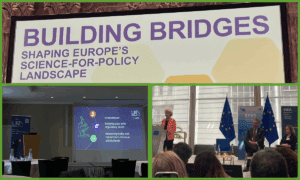One of the key topics of the hearing – which happened at the midpoint of the Spanish Presidency – was the EU Partnership for Research and Innovation in the Mediterranean Area (PRIMA). Primarily, John Bell pleaded for a rapid agreement on the extension of the programme. PRIMA, which, as Bell put it, is a “nexus for water, food and ecosystem” related research is also considered a key science-diplomacy tool, as it outlines collaboration between Mediterranean third countries (countries outside of the EU), while partially operating within the Horizon Europe framework. For this reason, it serves as one of the science-policy priorities of the Spanish Presidency of the Council of the European Union – as, according to Diana Morant, increasing territorial coherence through cross-border regional programmes is crucial. In addition, she highlighted the importance of the Mediterranian as an European border – further reinforcing PRIMA’s relevance.
Bell and Morant highlighted that, in addition to the extension, an increased budget as well as an alignment with Horizon Europe and agreements between EU or Horizon Associated members and unaligned countries were also outlined. However, Bell emphasized that these are only simple amendments, which do not require repeated impact assessment. They urged MEPs to pass the extension before the scheduled deadline, citing the importance of continuity within the programme. MEPs held favourable views towards PRIMA, with rapporteur Paolo Borchia stating that the parliament’s proposals will not be controversial.
Alongside PRIMA, Morant discussed amongst other topics, past and upcoming science-policy events – such as the science-diplomacy summit in December, as well as the nuances of the EU’s space policy, and Copernicus.



